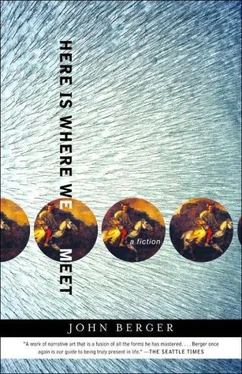His face was gaunt and so meticulously shaved it looked sore. He was wearing a pair of baggy corduroy trousers with a wide black leather belt that hung loose, almost at the level of his trouser pockets.
Perfect timing, he said, the water has just boiled. Whereupon he waited for me to make some remark.
It’s been a long time, I said.
By now we were at the top of the first short flight of stairs.
What kind of tea would you prefer: Earl Grey, Darjeeling or Green Leaf?
Green Leaf.
It’s the healthiest, he said, it’s what I drink every day.
The drawing room was full of rugs, cushions, objects, footrests, porcelain, dried flowers, collections, engravings, crystal decanters, pictures. It was hard to imagine anything new, anything new larger than a postcard, finding a home there, for there was no space. It was equally hard to imagine throwing a piece out to make more space, for everything had been found and chosen and placed over the years with the same love and attention. There was not a sea shell, a candlestick, a clock, a stool that stood out or appeared awkward. He indicated that I should sit in a Regency chair by the fireplace.
I enquired who had painted an abstract watercolour hanging near the door.
That’s one of Gwen’s, Hubert said. I’ve always liked it.
Gwen, his wife, a teacher of engraving, died twelve years ago. She was withdrawn, small, wore brogue shoes and looked like a lepidopterist. If she had held up her hand in the air anywhere — even on a wartime London bus — I would have expected a butterfly to land on it.
Hubert poured from a silver teapot into a Derbyshire cup on a table by the door and navigated around the many pieces of furniture across the room to deliver it to me. I wondered whether for him each room in the house had a navigation chart, like seas do. On the ground floor I had noticed the dining room was equally encumbered.
I made some cucumber sandwiches, if you would like one? he asked.
Thank you very much.
I had an aunt, he said, who maintained there were two golden rules about invitations to tea. One is that cucumber sandwiches and sponge cake are obligatory items, and the second is that guests have to insist upon leaving, and succeed in doing so, before six o’clock. .
I heard the ticking of a pendulum clock on the shelf behind me. There were at least four clocks in the room.
I want to ask you a question about our art-school days, I said. Do you remember a girl, the same year as us, who was studying Theatre Costume? She went around a lot with Colette.
Colette! replied Hubert, I wonder what has become of her? She used to come in with a new dress every week, remember? Often with the pins still in it.
She used to stay with Colette in her rooms in Guildford Place, I said. The rooms were on the first floor, overlooking Coram’s Fields. She was short, snub-nosed, had large eyes, was a little plump. Not at all talkative.
Coram’s Fields, said Hubert. I saw a painting of them in a show the other day. By a young painter called Arturo di Stefano. Kids on a hot, hot day by a swimming pool playing with the water. Full of the eternity — if I may so put it — of childhood!
No swimming pool there then, I said. Just a boarded-up bandstand, and the tall trees that looked down at us in the morning when we looked out of the window.
I don’t think I was ever at Colette’s place, Hubert said.
Do you see whom I’m thinking about though?
Was it Pauline who had an affair with Joe, the framer?
No, no, dark hair, short dark hair! Very white teeth. A bit stand-offish, walked around with her nose in the air.
You’re not thinking of Jeanne with the two n’s to her name?
Jeanne was tall! This one was small, roundish, tiny. She used to go home for weekends to somewhere smart like Newbury. Was it Newbury? Anyway, she loved horses.
Why do you need to know her name?
I’ve been trying for a long time to remember her name, and it keeps escaping me.
Was it Priscilla?
It was a very common name, that’s what’s so strange.
Probably she got married, most art students got married in those days and then her family name would have changed.
I only want her first name.
Are you trying to trace her whereabouts today?
On Mondays in June she came with strawberries from the countryside and would hand them round the whole class.
She may be dead, don’t forget!
There are only a few people today whom I can consult, that’s why I came to you.
True, unfortunately true. We are not so many. What was her work like?
Dull. Yet as soon as she came into a room you knew she had a sense of style. She shone. She said nothing and she shone.
I’ve always maintained that style is the inheritance of a number of talents. A single talent, however great, does not yield a sense of style. Did I take one of my pills? I’m talking too much.
I didn’t see you do so.
I wish I could place her for you. I’m afraid I can’t. She’s gone.
Nobody wore hats in those days, and she did! She wore a hat as if she was going to the races! Askew on the back of her head.
He said nothing. I let him think. And the silence continued. Hubert had always been prone to silences — as if life hung by a thread and foolish talking might snap it. In the silence I could feel that, since Gwen’s death, the standards the two of them had established and maintained here had in no way changed. What this room liked was still the same.
Let’s go upstairs, he finally said, and I’ll show you St Paul’s, a splendid view of St Paul’s from the balcony of my bedroom.
We took the stairs slowly. He held himself very upright. On the first landing he stopped and said: This terrace was built in the 1840s and the houses were destined for clerks who worked in the City. Poor man’s Georgian, as you can see. And it didn’t work out. Within a generation they had all been turned into lodging houses, with one or a couple of tenants living on each floor. And so it remained for a hundred years. When we arrived, forty years ago, the houses on the other side of the street didn’t even have electricity. Only gas and paraffin lamps.
The wall of the staircase we were climbing was hung with sketches for textiles and framed samples of precious fabrics, some of them Persian-looking.
Before we bought this house it was a brothel, serving the lorry drivers who delivered goods to London from the North. Come into the bathroom. See that mirror with the mermaids? The tenants left it in the bedroom downstairs and Gwen insisted upon keeping it. Sometimes I see Beatrice in it, Gwen would say laughing, Beatrice waving at me! Beatrice was a whore and her name is scratched on one of the window panes in the drawing room.
As Hubert straightened the mirror on the bathroom wall, I caught a glimpse of his face in the glass and was reminded of him as a young man. Perhaps something to do with the glass being speckled and darkened, so that the expression in his eyes was by contrast more sparkling.
When we moved in we had no money, so we told ourselves it might take as long to make a house as it takes to make a garden. We restored it room by room, there are seven, floor by floor, year by year.
On the top floor Hubert led me across his bedroom towards the French windows which gave on to a terrace.
Mind the geraniums! he said. I keep them out here to water them every morning.
They smell so strong!
Bloody cranesbill, he said, or in Latin: Geranium sanguineum.
I picked one of the leaves and sniffed it. It reminded me of her hair.
During the war ordinary soap was scarce, and there were no shampoos, unless you bought them on the black market. So newly washed hair smelt of itself. I remember her washing her hair in the morning after getting out of bed. It was summer and warm, and the windows were open. She washed it in an enamel handbasin which she filled with water from an enamel jug. There was no hot water in Colette’s flat. Then she came back, with a towel wrapped round her head and nothing else on, lay down on the bed beside me and waited until her hair dried.
Читать дальше












